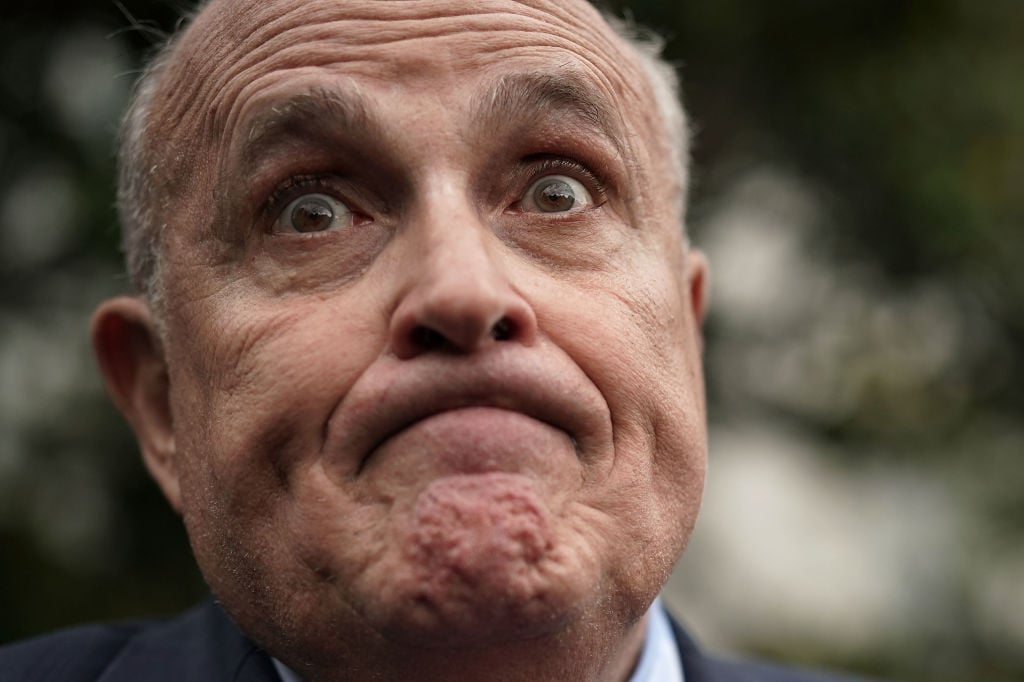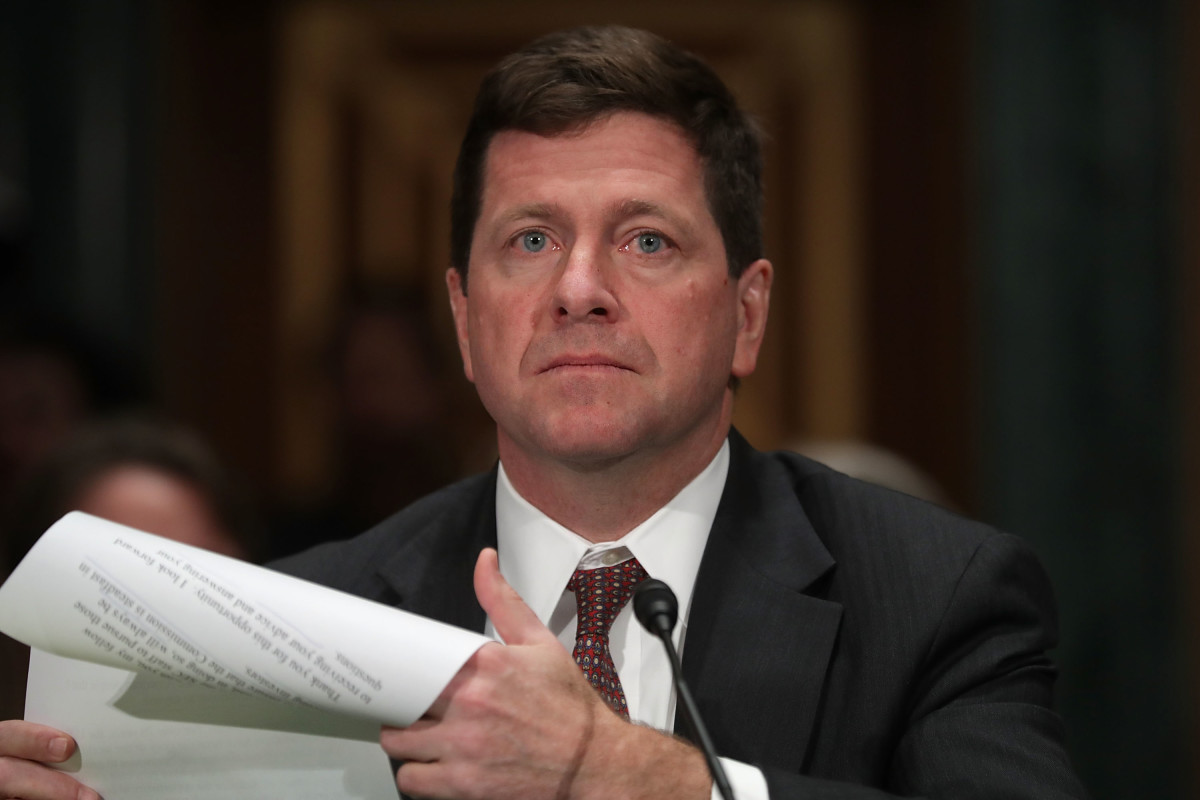Sally Yates, a top prospect for U.S. Attorney General (Photo by Alex Wong/Getty Images)
Thankfully, fortunately, and mercifully, the 2020 election is now over (and maybe even President Donald Trump is starting to acknowledge this). We can now start thinking about what to expect from a Biden-Harris administration.
For example, who might President Biden nominate to the U.S. Supreme Court, if he’s fortunate enough to have the opportunity? During the Democratic primaries, he publicly pledged to put a Black woman on the Supreme Court. I agree with the many legal analysts, such as Noah Feldman and Joe Patrice, who have identified Justice Leondra Kruger of the California Supreme Court and Judge Ketanji Brown Jackson of the U.S. District Court for the District of Columbia as the frontrunners. They’re impeccably credentialed, highly respected, eminently confirmable, and sufficiently young (Kruger is 44, Jackson is 50).
An outside pick, as I suggested on Twitter, might be Judge Leslie Abrams Gardner, of the U.S. District Court for the Middle District of Georgia. Judge Gardner is the sister of Stacey Abrams, former Minority Leader of the Georgia House of Representatives, whose voter registration efforts played a major role in helping Biden prevail in Georgia — and the President-elect owes the Abrams family a debt of gratitude. (Stacey Abrams has also occasionally been mentioned as a possible SCOTUS justice herself — she’s a lawyer, and she and I were law school classmates, in fact — but Stacy’s interests lie elsewhere.)
Of course, whether President Biden even gets a Supreme Court nomination remains to be seen. I highly doubt that any of the Republican-appointed justices plan on retiring during the next four years. And since the oldest among them, Justice Clarence Thomas, is just 72 — a spring chicken by SCOTUS standards — I’d be surprised to see any of them leave the Court involuntarily.
We do know, however, that President Biden will get to pick an attorney general — which brings me to my topic for today. Who will serve as attorney general during the Biden-Harris administration? As I did for the most recent Supreme Court nomination, I’ll handicap the field.
One caveat: the AG pick will not be made in a vacuum. Because Democratic presidents generally care more about diversity than Republican presidents, they have a harder time putting together a Cabinet. Making sure the Cabinet is diverse in terms of race, ethnicity, gender, sexual orientation, disability status, and other considerations — possibly including party affiliation, if Biden decides to include a Republican as a gesture of goodwill — can turn into an LSAT logic game from hell. So who gets the nod as attorney general will depend not just on her own qualifications for the role, but how she fits in demographically with the rest of the Cabinet.
Doug Jones: 3-to-1 odds (25 percent)
Age: 66
Current role: U.S. Senator from Alabama (since January 3, 2018)
Education: University of Alabama (B.A.), Samford University (J.D.)
Prosecutorial experience: U.S. Attorney for the Northern District of Alabama (1997-2001); Assistant U.S. Attorney (1980-1984)
I consider Jones, who recently lost his re-election bid in super-conservative Alabama, to be the frontrunner. As a former AUSA and then U.S. Attorney, he has extensive prosecutorial experience and an impressive record as a prosecutor, winning acclaim for successfully prosecuting two members of the Ku Klux Klan for their roles in the 1963 16th Street Baptist Church bombing. He’s also a friend of the President-elect, having worked on Biden’s first presidential campaign back in 1988.
Doug Jones is not only extremely qualified, he’s also the easiest to confirm. Senators tend to be nice to their former colleagues when it comes to confirmation; recall how Hillary Clinton, one of the most controversial figures in modern politics, was confirmed as Secretary of State by a vote of 94-2. And Jones is well-liked within the chamber, not just within his own caucus but among Republicans as well (partly because of his strong record of bipartisanship in sponsoring legislation).
Jones’s main (and perhaps only) liability: he’s a straight white guy. So whether he gets the nomination will depend in significant part on whether there’s enough diversity in the rest of the Cabinet.
Sally Yates: 3-to-1 odds (25 percent)
Age: 60
Current role: Partner, King & Spalding
Education: University of Georgia (B.A., J.D.)
Prosecutorial experience: Deputy Attorney General (2015-2017); U.S. Attorney for the Northern District of Georgia (2010-2015); Assistant U.S. Attorney (1989-2004).
Like Jones, Sally Yates is amply qualified to serve as attorney general. And she actually held the role in an acting capacity for 10 days early in the Trump administration, during which she became a hero of the resistance after getting fired for refusing to defend President Trump’s so-called “Muslim ban” (i.e., his executive order barring entry to the United States by foreign nationals of seven predominantly Muslim countries).
This controversial capstone to her career in government shouldn’t overshadow the fact that Yates has more than 25 years of prosecutorial experience, dating back to her hiring as an AUSA by then-U.S. Attorney Bob Barr (yes, that Bob Barr, later a prominent Republican congressman). As an AUSA, Yates gained fame from prosecuting Eric Rudolph, the domestic terrorist responsible for the Centennial Olympic Park bombing.
Yates is definitely a top contender — as reflected in the prominent speaking role she was given in the Democratic National Convention that nominated Joe Biden. Her main liability, at least compared to Doug Jones, is that she might be a somewhat heavier lift in terms of confirmation. Even though she’s really a career prosecutor and shouldn’t be controversial, some Republican senators, especially those beholden to President Trump and his base, might oppose her because of her “insubordination” in refusing to defend the Muslim ban.
I think Yates could still win confirmation. The filibuster of executive-branch nominees is no longer a thing, at the end of the day, I think she’d win support from at least some combination of Senators Collins, Murkowski, and Romney.
Xavier Becerra: 4-to-1 odds (20 percent)
Age: 62
Current role: Attorney General of California (since January 24, 2017)
Education: Stanford University (B.A., J.D.)
Prosecutorial experience: Attorney General of California (2017-present); Deputy Attorney General, California Department of Justice (1987-1990)
Becerra doesn’t have as much prosecutorial experience as either Jones or Yates — and he has never been a federal prosecutor, just a state prosecutor — but he’s definitely in the mix. He’s popular among progressives, based on his track record not just as California AG but as a member of the U.S. House of Representatives for 24 years, and as a Mexican American, he’d add diversity to the Cabinet.
His odds as AG would be better if not for the fact that he’s also in the running for two other plum posts. First, Governor Gavin Newsom might want to appoint Becerra to the Senate seat that will be vacated by Kamala Harris in January (and Becerra previously replaced Harris as California AG). Second, Becerra could end up being nominated for Secretary of Homeland Security.
Tom Perez: 4-to-1 odds (20 percent)
Age: 59
Current role: Chair, Democratic National Committee (since February 25, 2017)
Education: Brown University (A.B.), Harvard University (J.D., M.P.P.)
Prosecutorial experience: Assistant Attorney General, Civil Rights Division (2009-2013); Deputy Assistant Attorney General, Civil Rights Division (1998); Attorney, Civil Rights Division (1989-1995)
If Perez were to become attorney general, it would be his second stint in the Cabinet, since he previously served as Secretary of Labor under President Obama (2013-2017). Perez has significant DOJ experience, having served as both AAG for the Civil Rights Division in the Obama administration and as a line attorney and later deputy assistant attorney general in the CRD in the Clinton administration. He’d also bring diversity to the Cabinet, as the son of two first-generation immigrants from the Dominican Republic.
But Perez’s current role as chair of the DNC hasn’t endeared him to Republicans. And even before this, he wasn’t the most popular on the other side of the aisle; he was confirmed as Labor Secretary without any Republican support, the first time in history that a Cabinet nominee won confirmation on a strict party-line vote. So he’s a bit of a long shot for AG (plus it’s possible he could get nominated for a return engagement as Labor Secretary instead).
The field: 10-to-1 odds (9 percent)
In craps, the field is a sucker bet — and that’s probably the case in the Biden AG sweepstakes too. The four frontrunners are so far ahead of the other contenders that two separate Cabinet speculation stories, those of the New York Times and Politico, feature the same four names.
But even if they might be long shots, some of the contenders in the field would actually be very solid picks for AG. One is Jeh Johnson, current Paul Weiss partner and former Secretary of Homeland Security (and former General Counsel of the Department of Defense; I had the pleasure of profiling him when he held that role). A second is Senator Amy Klobuchar, who served as Hennepin County Attorney before joining the U.S. Senate. A third is Judge Leslie Abrams Gardner (mentioned above), who served as an assistant U.S. attorney (2010-2014) before taking the bench.
All are qualified to serve and all would, I believe, serve admirably in the role. But there are challenges to their AG chances. Jeh Johnson is a victim of his own success: he’s in the running for Secretary of Defense (and would make history as the first Black SecDef), as well as Director of National Intelligence. Amy Klobuchar’s record as Hennepin County Attorney — during which she increased prosecutions, except against police officers accused of misconduct — garnered much criticism from civil-rights groups both during her presidential run and when she was being considered as a possible Biden VP (in the wake of the horrific killing of George Floyd in Minneapolis — part of Hennepin County, her former jurisdiction). And Judge Gardner, a relatively new judge (appointed in 2014), might not want to give up a lifetime appointment to the federal bench for an AG stint of uncertain duration.
So there’s a lot of uncertainty and fluidity in the race for attorney general. But one thing’s for sure: when it comes to possible AG picks, President-elect Biden enjoys an embarrassment of riches.
 David Lat, the founding editor of Above the Law, is a writer, speaker, and legal recruiter at Lateral Link, where he is a managing director in the New York office. David’s book, Supreme Ambitions: A Novel (2014), was described by the New York Times as “the most buzzed-about novel of the year” among legal elites. David previously worked as a federal prosecutor, a litigation associate at Wachtell Lipton, and a law clerk to Judge Diarmuid F. O’Scannlain of the U.S. Court of Appeals for the Ninth Circuit. You can connect with David on Twitter (@DavidLat), LinkedIn, and Facebook, and you can reach him by email at dlat@laterallink.com.
David Lat, the founding editor of Above the Law, is a writer, speaker, and legal recruiter at Lateral Link, where he is a managing director in the New York office. David’s book, Supreme Ambitions: A Novel (2014), was described by the New York Times as “the most buzzed-about novel of the year” among legal elites. David previously worked as a federal prosecutor, a litigation associate at Wachtell Lipton, and a law clerk to Judge Diarmuid F. O’Scannlain of the U.S. Court of Appeals for the Ninth Circuit. You can connect with David on Twitter (@DavidLat), LinkedIn, and Facebook, and you can reach him by email at dlat@laterallink.com.



















